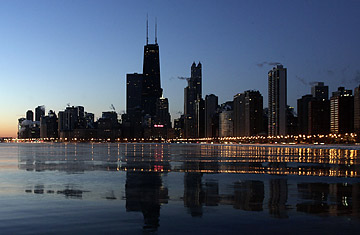
In recent days, Chicago has gotten a makeover of sorts. The tops of many of the buildings that make up its iconic skyline are decked out in the Olympic colors of blue, red,yellow, green and black, while placards hoisted along its streets proclaim the slogan, LET FRIENDSHIP SHINE. It's all in preparation for this weekend's visit of 13 representatives from the International Olympic Committee, whose judgement could make or break Chicago's bid to host the 2016 Summer Games. (See the top 10 sports moments of 2008.)
It's an opportunity city officials don't want to slip by them again. In 1901, Chicago won the right to host the first- ever Midwestern Olympics, in 1904, but lost the Games to its then-rival St. Louis after that city threatened to host a competing event. For many here, the prospect of hosting the Olympics is a point of significant pride, evidence that America's third-largest city has shed its image as a blue-collar also-ran to the more urbane coastal centers. And the city's mayor, Richard M. Daley, clearly views winning the Games as a capstone of his nearly two-decade rule. "The Olympics is the No. 1 showcase on the world circuit of mega events," says John R. Gold, professor of social sciences and law at Britain's Oxford Brookes University, and co-author of Olympic Cities: City Agendas, Planning, and the World's Games, 1896-2012. He adds, "Even to be on the short-list is a major achievement — it puts you right up there with the world's major cities." (See 10 things to do in Chicago.)
Chicago has formidable competition: the 2016 Games' final four candidates also include Madrid, Tokyo and Rio de Janeiro. Considering that London is to host the 2012 Summer Games, a sense of continental equity could bolster the IOC's desire to return the event to the Americas. Rio would be the first South American city to host the Games, but there is grave concern about its ability to afford the significant infrastructure and security requirements. American Olympic officials are betting they can sell the IOC on Chicago's robust sports culture and the city's relatively harmonious ethnic and racial diversity. The Olympic Village is to be built along Lake Michigan, just south of downtown. An 80,000-seat Olympic Stadium is to be built in Washington Park, which is tucked between a middle-income neighborhood of rowhouses and a rather bleak stretch of Chicago's South Side. Officials here also will play up Chicago's extensive public transportation network, although there is reason to be skeptical about whether its train system — which is aging, prone to delays and frequently dirty — can be significantly improved in time for the Games. And being the adopted home of the leader of the free world doesn't hurt either: President Obama has long expressed support for Chicago's bid and appeared in a video promoting it shortly after last November's election. (See pictures of Chicago.)
To succeed, Chicago officials must also prove there is broad public support for hosting the Olympics. According to a recent survey commissioned by Chicago 2016, some 77% OF Chicagoans expressed such support. But there is still widespread skepticism and disapproval. There have already been significant anti-Olympics protests, one of which included thousands of the city's roughly 13,000-member police force, who are seeking a pay raise. Meanwhile, critics question the suitability of the moderately-sized Washington Park for an Olympic Stadium — and argue that despite officials' pledges to downsize the stadium after the Games, the park's landscape will be destroyed.
But the main question on Chicagoans minds is how a city mired in the deepening global recession — its unemployment rate hit 9.7% in February — can afford to host a $3.3 billion party. "The city of Chicago is closing public schools, and they've closed public health clinics. Where is all the money going to come from when the city is suffering in this way?" asks Tom Tresser, spokesman for No Games, one of the groups that protested. Hosting the Games, he says, "would be a city-killer for us." Officials say much of the Games' cost will come from private financing, and it certainly helps their case that most traditional Olympic sponsors are U.S. based — and that one of the biggest, McDonald's, is headquartered in suburban Chicago. But it's hard to imagine that many firms will make significant financial commitments in this grim economic environment. Moreover, studies show the long-term economic and financial benefits of hosting the Olympics are debatable at best. Montreal, for instance, failed to pay the debt it incurred hosting the 1976 Games until 2006. Still, the Chicago bid's proponents are confident. "The Olympics is bigger than Mayor Daley," Daley said earlier this week, referring to himself in the third person. "This is about the vision for the city. This is about transforming the city." As for the protests, Olympic organizers have no choice but to put the best face on the situation. "If they want to demonstrate," said Daley, "so be it."
